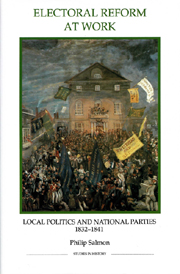Book contents
- Frontmatter
- Contents
- List of illustrations
- List of figures
- List of tables
- Dedication
- Acknowledgements
- Abbreviations
- Introduction
- PART I THE REFORMED ELECTORAL SYSTEM
- PART II THE COUNTIES
- PART III THE BOROUGHS
- 6 No representation without taxation: rates and votes
- 7 The electoral politics of municipal reform
- Conclusion
- Appendices
- Bibliography
- Index
Conclusion
from PART III - THE BOROUGHS
Published online by Cambridge University Press: 12 September 2012
- Frontmatter
- Contents
- List of illustrations
- List of figures
- List of tables
- Dedication
- Acknowledgements
- Abbreviations
- Introduction
- PART I THE REFORMED ELECTORAL SYSTEM
- PART II THE COUNTIES
- PART III THE BOROUGHS
- 6 No representation without taxation: rates and votes
- 7 The electoral politics of municipal reform
- Conclusion
- Appendices
- Bibliography
- Index
Summary
This study set out to fill an obvious gap in the historiography of the Great Reform Act of 1832, by examining the practical consequences of its curiously neglected provisions concerning voter registration, rate payments and other such ‘small print’. But in tracing these developments, it has also helped to clear up much of the confusion surrounding the Reform Act's broader impact and meaning, especially with regard to its dramatic modernising effects on the ground. In particular, it has been able to relate the widely-noted emergence of more modern types of voting behaviour after 1832 to the new ways in which the franchise was actually being acquired, adding a further layer of sophistication to the ideological and sociological explanations of politics provided in more conventional accounts. Put simply, it has demonstrated that the circumstances in which the vote was obtained during the 1830s had a powerful influence on how it was employed in that decade's spate of general elections. This does not deny the importance of issues and ideology in shaping electoral behaviour – it simply brings to prominence the role also played by the operation of the representative system, which was subject to far less regional variation and local interpretation. Perhaps most significantly, however, this book has shown that the politicising ‘knock-on’ effects of the Reform Act's provisions concerning registration and the payment of rates were not just confined to the electorate, where most attention has traditionally been focused, but that they also affected local administration and bureaucracy.
- Type
- Chapter
- Information
- Electoral Reform at WorkLocal Politics and National Parties, 1832–1841, pp. 238 - 248Publisher: Boydell & BrewerPrint publication year: 2002



